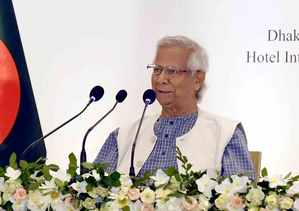International
IANS Analysis: Pak military draws legitimacy from nation's perpetual security crisis
New Delhi: Pakistan, a country beset by a myriad of internal and external challenges, has often found itself teetering on the edge of security crises.
These crises have not only shaped the nation’s political landscape but have also played a pivotal role in legitimizing the pervasive influence of its military establishment.
Despite being a de facto military state, Pakistan’s security scenario remains precarious, with the military exploiting this insecurity to cement its authority and control.
This article delves into the intricate dynamics of Pakistan’s security crisis, the military’s vested interests in perpetuating these crises, and the consequent political engineering that has stymied the nation’s democratic aspirations.
Historical context: The military’s ascendancy
Since its inception in 1947, Pakistan has experienced a tumultuous political history characterised by intermittent military coups and prolonged periods of martial law. The military’s ascendancy can be traced back to the early years of independence when the nascent state faced existential threats from both internal insurgencies and external conflicts, most notably with India.
The military, positioning itself as the guardian of Pakistan’s sovereignty and integrity, gradually entrenched its influence in the political and administrative spheres.
The 1958 coup led by General Ayub Khan marked the beginning of direct military rule, which continued under various guises through subsequent decades.
The narrative of an ever-looming security threat, whether from neighbouring India, internal separatist movements, or global terrorism, has been a constant refrain used by the military to justify its dominance.
This narrative has been instrumental in creating a securitised state where the military’s role transcends traditional defence duties to encompass governance, economic management, and foreign policy.
Security crisis: A perpetual state of emergency
Pakistan’s security landscape is a complex web of threats ranging from insurgencies in Balochistan and Khyber Pakhtunkhwa to terrorist activities orchestrated by groups like Tehrik-i-Taliban Pakistan (TTP) and sectarian violence.
Despite substantial military operations such as Operation Zarb-e-Azb and Operation Radd-ul-Fasaad, which were aimed at dismantling terrorist networks and restoring order, the country continues to grapple with sporadic attacks and unrest.
One might question how, despite such extensive military involvement and operations, the security scenario remains in the doldrums. The answer lies in the intricate interplay between the military’s strategic interests and its need to maintain a facade of indispensability.
The perpetuation of a security crisis serves as a justification for the military’s overarching presence in all facets of Pakistani society. This state of perpetual emergency ensures that the military remains the ultimate arbiter of national policy, thereby stifling democratic processes and civilian governance.
The military’s involvement in political engineering is a well-documented phenomenon. From orchestrating coups to influencing electoral outcomes, the military has consistently manipulated the political process to ensure that civilian governments remain subservient to its agenda.
The creation of the Islami Jamhoori Ittehad (IJI) in the late 1980s, a political alliance aimed at countering Benazir Bhutto’s Pakistan People’s Party (PPP), is a prime example of the military’s covert political manoeuvring.
More recently, the military’s influence was evident in the 2018 general elections, where Imran Khan’s Pakistan Tehreek-e-Insaf (PTI) emerged victorious amidst widespread allegations of electoral manipulation. The military’s support for Khan was perceived as a strategic move to install a pliant government that would align with its interests. This symbiotic relationship between the military and selected civilian leaders ensures that the military’s hegemony remains unchallenged.
Operations and interventions: Garnering sympathy and control
The military’s operational interventions, often cloaked in the rhetoric of national security, serve dual purposes: addressing security threats and bolstering its image as the saviour of the nation.
High-profile operations against terrorist outfits and separatist groups are meticulously publicised to reinforce the narrative of the military’s indispensability. These operations, while achieving tactical successes, often fail to address the root causes of militancy and insurgency, thereby ensuring the persistence of security challenges.
In addition to kinetic operations, the military’s involvement in non-traditional roles, such as disaster management and economic projects, further consolidates its image as a multifaceted institution crucial to national stability.
For instance, the military’s role in the construction of infrastructure projects under the China-Pakistan Economic Corridor (CPEC) not only underscores its economic clout but also its strategic importance in fostering Pakistan’s economic development.
The military’s vested interests extend beyond the realm of security into the economic domain. The military-industrial complex, comprising a vast network of businesses owned and operated by various military foundations, wields significant economic power.
Institutions such as the Fauji Foundation and the Army Welfare Trust have substantial stakes in sectors ranging from agriculture and real estate to banking and telecommunications.
This economic empire not only enriches the military elite but also creates a dependency on the military for economic stability and growth. The intertwining of military and economic interests ensures that any challenge to the military’s dominance is perceived as a threat to national stability, thereby legitimising its continued intervention in civilian affairs.
Paradox of security and insecurity
The paradox of Pakistan’s security crisis lies in the fact that despite the military’s extensive involvement in security matters, the country remains ensnared in a web of insecurity. This paradox can be attributed to the military’s strategic calculus, which views the perpetuation of security threats as a means to justify its overarching role.
The cyclical nature of security operations, followed by periods of relative calm and subsequent resurgence of violence, creates a perpetual state of insecurity that necessitates continuous military intervention.
Moreover, the military’s prioritisation of security over democratic governance has stymied the development of robust civilian institutions capable of addressing the root causes of insecurity.
The marginalisation of civilian law enforcement agencies and the judiciary has created a security apparatus heavily reliant on military solutions, often at the expense of human rights and civil liberties.
Addressing Pakistan’s security crisis necessitates a fundamental shift in the country’s governance paradigm. The democratisation of Pakistan, characterised by robust civilian oversight of the military, is imperative for breaking the cycle of insecurity and military dominance.
Strengthening democratic institutions, empowering civilian law enforcement agencies, and fostering a culture of political accountability are essential steps toward achieving sustainable security.
The international community, particularly Pakistan’s allies and aid donors, also has a role to play in encouraging democratic reforms and civilian supremacy. Conditioning military aid on demonstrable progress in democratisation and human rights can incentivise the military to cede space to civilian governance.
The Pakistani security crisis, perpetuated by the military’s vested interests and strategic calculus, underscores the delicate balance between security and democracy.
The military’s exploitation of security threats to justify its dominance has created a paradoxical scenario where the pursuit of security engenders perpetual insecurity.
Breaking this cycle requires a concerted effort to democratise Pakistan’s political landscape, strengthen civilian institutions, and foster a culture of accountability and transparency.
Only through a genuine commitment to democratic governance and civilian oversight can Pakistan hope to achieve sustainable security and stability.
The path to this goal is fraught with challenges, but it is a journey that Pakistan must undertake to fulfil the aspirations of its people for peace, prosperity, and democratic governance.
–IANS
dan/
International
Laos seeks to enhance nutrition amid climate change concerns

Vientiane (Laos), Aug 22 (IANS) Representatives from the Lao government and development partners have attended a conference here titled “Climate Change and Nutrition in Laos: Intersections and Interventions” to discuss the impact of climate change on nutrition in the Southeast Asia country and potential solutions.
Speaking at the conference, deputy director general of the Department of Hygiene and Health Promotion under the Lao Ministry of Health Viengkhan Phixay, said, “We gather to address a critical and interwoven issue: the impact of climate change on nutrition and how we can work together to tackle these challenges,” Xinhua news agency reported.
The Lao government is actively engaged in this endeavor, with numerous policies and initiatives aimed at addressing both climate change and nutrition, Lao National Television reported on Thursday.
“By leveraging the Scaling Up Nutrition network in Laos, which is led by the government, and supported by civil society, donors, and the United Nations, we have a robust platform to tackle the negative impacts of climate change while improving nutrition and overall health for everyone in Laos,” Viengkham said at the conference held on Monday.
The conference featured a series of presentations that not only detailed evidence-based research but also introduced innovative tools for measuring and enhancing nutrition under the impact of climate change.
The conference stressed the critical need for integrated approaches to tackle the intertwined challenges of climate change and nutrition, and setting the stage for impactful future collaborations.
–IANS
int/psd
International
One killed, seven injured in shootout in Iraq

Baghdad, Aug 22 (IANS) A civilian was killed while seven others were injured on Thursday in a tribal shootout in Iraq’s holy Shiite province of Najaf, according to a local security source.
The shootout erupted in the early hours between armed men from the local tribe in the al-Zarga area in northern Najaf, some 160 km south of Baghdad, a local police officer told Xinhua on condition of anonymity.
The clash resulted in the killing of an Iraqi civilian and the injury of seven others, including three Iranian Shiite pilgrims, the source added.
A joint force from the Interior Ministry’s emergency response division and Najaf provincial police arrested 53 gunmen from both sides of the shootout and seized weapons and ammunition, the Interior Ministry said in a statement.
It added that search operations are ongoing to locate additional gunmen and weapons, with more details to be released later.
The incident took place as numerous pilgrims traveled to the city of Karbala to observe Arbaeen, which marks the end of a 40-day mourning period for the killing of Imam Hussein, the grandson of Prophet Muhammad, in the Battle of Karbala in 680 A.D.
Typically, these pilgrims also visit Najaf as part of their journey to Karbala.
–IANS
int/jk/arm
International
Bangladesh seeks $1 billion budget support from World Bank

Dhaka, Aug 22 (IANS) Bangladesh’s interim government has sought $1 billion from the World Bank as budgetary support.
The call came from the country’s Power, Energy and Mineral Resources Adviser Muhammad Fouzul Kabir Khan’s meeting with Abdoulaye Seck, the World Bank’s Country Director for Bangladesh and Bhutan, in Dhaka on Wednesday.
He made the plea as the ministry owes more than 2 billion dollars to suppliers in import costs of power and energy, Xinhua news agency reported.
Khan mentioned that the interim government, which was formed with many pressing mandates, is due to settle a $2 billion debt left by the previous government in the power sector.
He said they have already suspended activities under the much-criticized Quick Enhancement of Electricity and Energy Supply Act 2010 and abolished the government’s power to set energy prices without any public hearing.
On August 5, the former Prime Minister of Bangladesh, Sheikh Hasina, was ousted from her country and power, ending her rule since January 2009.
This event was seen as a massive escalation, with what initially started as student’s protests and resulted in a major crisis in Bangladesh.
Earlier on August 8, Nobel laureate Muhammad Yunus took oath as the head of Bangladesh’s interim government.
–IANS
int/jk/as
International
Search for missing migrants underway after boat capsizes in Serbia: Ministry
Belgrade, Aug 22 (IANS) Serbian police are still searching for seven missing migrants in the Drina River after their boat capsized when crossing from Serbia to Bosnia and Herzegovina, Serbia’s Interior Ministry confirmed in a press release issued on Thursday.
According to testimonies of the migrants who managed to reach the shore, there were approximately 25 people on board. So far, police and rescue teams have found 18 individuals, including three children, on the riverbank, Xinhua news agency reported.
Serbian Deputy Prime Minister and Minister of the Interior Ivica Dacic said police and the Emergency Situations Sector responded promptly after being alerted by the Bosnian border authorities early Thursday morning.
An intensive search is underway in the Drina River and its surrounding area.
The European Border and Coast Guard Agency, Frontex, reported a significant decrease in illegal border crossings in the Western Balkans during the first half of 2024.
The illegal crossings towards EU borders reached 12,407 between January and July 2024, a 75 per cent drop compared to the same period last year.
–IANS
int/jk/as
International
Islamabad sealed with containers amid threats of religious and political protests

Islamabad, Aug 22 (IANS) Islamabad, the capital of Pakistan, turned into a fortress on Thursday with dozens of containers forcing closure of several roads with heavy deployment of law enforcement forces following the cancellation of a No-Objection Certificate (NOC) of an anti-government protest planned by Pakistan Tehreek-e-Insaf (PTI) and protest call by religious parties, including the Jamaat-e-Islami (JI), Jamiat Ulema-e-Islam (JUI) under the banner of Majlis-e-Tahaffuz-e-Khatme Nabuwwat against a Supreme Court decision in the Mubarak Sani case.
Anticipating widespread protests, the local administration, which had cancelled the NOC, imposed Section 144 in the city, barring assembly of people and also closed all educational institutions for the day.
Later in the day, the PTI announced its decision to postpone its protest rally and rescheduled it for September 8.
The government maintained that it did not want to take any chance considering the Supreme Court hearing and also the presence of Bangladeshi cricket team in the country which is currently touring Pakistan for a Test series.
On Wednesday, the capital administration of Islamabad decided to cancel the NOC for PTI, less than 24 hours before the scheduled public gathering in Tarnol area. PTI had earlier announced that it would go ahead with its planned gathering even after its NOC was revoked.
“It is concerning that the government might try to exploit the rally to incite unrest and blame it on PTI. They are scared and are trying to find ways to orchestrate cases against us,” said senior PTI leader Azam Swati.
Imran Khan’s party has been struggling to hold a political gathering in the capital for the past five months with the local administration delaying grant of any permission to hold such an event. Even after a permission is granted, it ends up being revoked a few hours later.
The latest episode is the second time the capital administration has cancelled the NOC issued to PTI for holding a political gathering at Tarnol.
The government maintains that it had detailed meeting with the Inspector General Police, Deputy Commissioner, senior officers from the Chief Commissioner’s office, officials of the Inter-Services Intelligence (ISI), Military Intelligence (MI) and Intelligence Bureau (IB) after which it was decided that there will be serious law and order concerns if the gathering is allowed.
On the other hand, several religious parties have also taken to the streets in Islamabad, protesting against the Supreme Court of Pakistan’s verdict in the Mubarak Sani case.
Tehreek-e-Khatam-e-Nabuwat, an umbrella name for different religious parties, has called for a protest in front of the Supreme Court after the July 24 Supreme Court verdict in the case, maintaining and ruling that while Ahmadis are declared non-Muslims, they retain the right to profess and proliferate their religion, provided they do not publicly use Muslim terms or introduce themselves as Muslims.
In February 2024, Mubarak Ahmed Sani, an Ahmadi, was accused of violating the Punjab Holy Quran (Printing and Recording) Amendment) Act 2021 by distributing the proscribed book ‘Tafseer-e-Sagheer’. However, the Supreme Court maintained that the alleged act occurred in 2019, before it was criminalised in 2021.
The Supreme Court decision was widely criticized by the religious groups who demanded the federal and the Punjab government to challenge the decision and ensure punishment for Sani.
The Punjab government later filed a review petition in the Supreme Court while a petition was also filed by the Federal government on directions of the Prime Minister Shehbaz Sharif.
–IANS
hamza/as/
-
Video1 year ago
PM Modi Attacks Congress in Karnataka with “Kerala Story”
-
Cricket1 year ago
CSK players rejoice 5th IPL title with their families (Pics)
-
Politics1 year ago
Siddaramaiah & DK Shivakumar sworn in as Chief Minister & Deputy CM respectively
-
Entertainment1 year ago
Karan Deol weds his longtime Girlfriend Drisha Acharya (Pics)
-
Entertainment1 year ago
Urvashi Rautela dazzles on Cannes 2023 red carpet (Pics)
-
Entertainment1 year ago
Sunny Leone gets ready for Kennedy premiere in Cannes (Pics)
-
Entertainment1 year ago
Alia Bhatt looks crazy beautiful in Prabal Gurung creation at MET GALA 2023 (Pics)
-
Sports6 years ago
History Of Official FIFA WORLD CUP Match balls






























